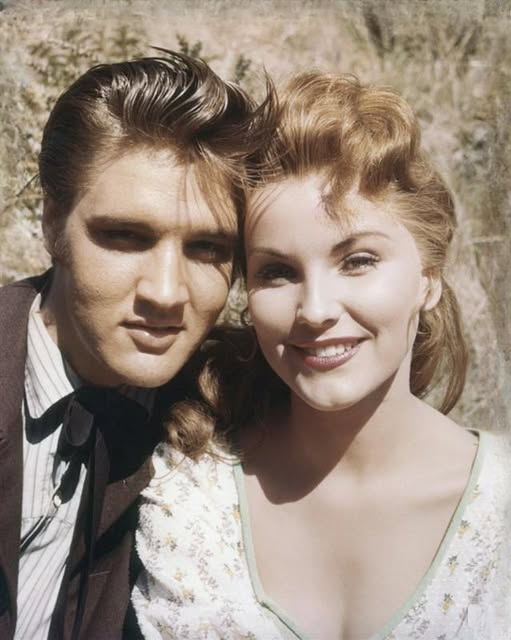Elvis Presley’s debut film, Love Me Tender, stands as one of those rare moments in pop culture where history, hysteria, and human emotion collided on screen. For millions of fans, it marked the moment the King of Rock ‘n’ Roll stepped off the concert stage and into Hollywood — a leap that forever changed not only his destiny but also the relationship between music and cinema. Yet behind the roar of the crowds and the blinding flash of fame lies a quieter, more human side of Elvis, often overlooked even by his most devoted fans.
When Love Me Tender premiered in November 1956, it wasn’t just another movie. It was a phenomenon, a cultural earthquake. Elvis was already a household name — his songs ruled the airwaves, his hips sparked controversy, and his charisma had redefined performance itself. Hollywood, eager to harness his magnetic appeal, built a film around him. The project was originally titled The Reno Brothers, but as the song “Love Me Tender” climbed the charts before the film’s release, the studio wisely renamed the film, cementing a unique synergy between music and motion pictures.
Set in the aftermath of the Civil War, the story blends drama, romance, and Western grit. Elvis plays Clint Reno, the youngest of four brothers, the only one who stayed home while the others went to war. It’s a tale of loyalty, sacrifice, and jealousy — simple yet deeply emotional. And though modest by today’s standards, the film carried weight thanks to Elvis’s sincerity and raw presence. For a first-time actor, he approached the role with surprising seriousness.
Behind the camera, Elvis was humble, hardworking, and eager to learn. Director Robert Webb and producer David Weisbart later recalled that despite the chaos of his fame, he arrived every day on time, polite and prepared. He memorized not only his lines but those of his co-stars, absorbing every detail of the filmmaking process. Co-star Debra Paget described him as “gentle, polite, and surprisingly shy” — nothing like the swaggering, hip-shaking rock idol the world knew from the stage.
Still, his magnetism was undeniable. Though the role wasn’t originally written as a musical, the studio realized audiences wouldn’t accept a silent Elvis. Four songs, including the soon-to-be-iconic “Love Me Tender,” were added, transforming the modest Western into a hybrid of story and song. The move was commercially brilliant, but it also set a precedent: films built more around Elvis’s music than his acting.
When the film premiered in New York City, the reaction bordered on mania. Over 1,500 fans camped outside the Paramount Theatre, screaming whenever his name was mentioned. Inside, the audience was so loud that parts of his dialogue were drowned out. Critics were split — some skeptical, others intrigued — but the public had made up its mind: Elvis Presley wasn’t just a singer; he was a cultural force.
Behind the frenzy, however, was a small, tender story that few knew — one involving his mother, Gladys Presley. Deeply emotional and fiercely protective, she was devastated by her son’s character dying onscreen. So moved were the filmmakers that they added a final shot: a ghostly silhouette of Elvis singing “Love Me Tender” over the closing credits. That haunting image softened the tragedy and gave fans hope — a promise that, even in fiction, Elvis’s spirit could never truly die.
That change also led to a fascinating continuity quirk. During principal filming, Elvis had his natural light brown hair. By the time the new ending was shot, he had dyed it jet black — a look that would define him for decades. The result: an almost poetic error, showing a darker-haired Elvis singing from “beyond the grave.”
The film was not without its oddities. Eagle-eyed viewers have spotted zippers on period pants, glimpses of 1950s cars, and scenes where Elvis stops strumming but the guitar sound continues. A gun vanishes and reappears between shots. These quirks, rather than ruin the film, now add nostalgic charm — reminders of Hollywood still learning to manage the chaos of rock ‘n’ roll stardom.
Perhaps the most intriguing stories come from the human connections behind the scenes. Debra Paget, Elvis’s co-star, was already a rising star when filming began. Initially unsure what to expect from the world-famous singer, she soon found him warm and humble. He treated her and her mother with genuine respect, and a tender affection grew between them. Legend says Elvis even proposed, but Paget declined, bound by her parents’ wishes and a budding relationship with billionaire Howard Hughes. Years later, Priscilla Presley would famously style her hair to resemble Paget’s from Love Me Tender, perhaps a quiet tribute to the woman her husband had once loved.
In the end, Love Me Tender is more than just Elvis’s cinematic debut. It’s a snapshot of a cultural earthquake, a story of a star stepping into a new world, and a glimpse at the tender, human side of the man behind the legend. Through triumphs, quirks, and quiet moments of care, Elvis’s first film offers more than entertainment — it offers a lesson in humanity, fame, and the beginnings of an enduring icon.
